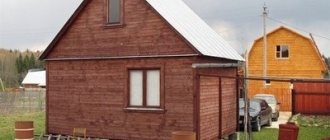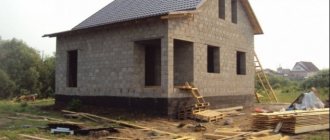Legislative regulation of the issue
If we turn to No. 93-FZ, it becomes clear that a citizen can confirm his rights to buildings erected on a personal plot in a simplified manner.
To do this, you need to register real estate. To briefly convey the meaning of the law, it is that previously unauthorized construction was not prosecuted by the law. The owner of the plot could build a garage or bathhouse at any time, without having to contact the authorities and obtain permission.
Expert opinion
Natalya Titova
Property lawyer. Work experience as a lawyer - 11 years. A large number of cases won
View lawyer's comments
When it turned out that there were buildings on the land, they could be legalized at any time, without any liability for the owner of the site. If he wanted to register a house previously built on a personal plot, he had to provide the documents specified in Art. 3 No. 93-FZ. With their help, a citizen could confirm that he owns the land plot on which the object was built.
Legislation is constantly changing, so innovations have also affected the law on “dacha amnesty”.
Here's another similar situation. On the land plot, which is registered as a property, there is a dilapidated house built in 1928. It is registered as a property, but our reader wants to deregister it and use it as an outbuilding. Is this possible? She has a new house, but she cannot register ownership because the local architecture department requires the old house to be demolished. Roman Larin: In this case, there is no application procedure for deregistering and registering the rights of a residential building registered as a property and transferring it to the status of an outbuilding.
The deregistration procedure is provided only in connection with the cessation of the existence of an object. To confirm the existence of the house, you will need to order a house inspection report from a cadastral engineer. But first you really need to demolish the house. What, you can’t have two houses?
Roman Larin: Theoretically, it is possible to build two houses on one plot of land. But only in compliance with the norms of land and town planning legislation, building codes and regulations, in particular, the area of the land plot should allow such construction. In this case, most likely, the land plot does not physically allow the construction of a second residential building on it, since the necessary setbacks from the boundaries and other norms and regulations (for example, fire safety) will not be observed. That is why the applicant is denied approval for such construction and is recommended to demolish the first house. But you can try to recognize the right to a second home in court.
Vladimir Vasilyevich Khabarov from Ryazan is the chairman of the Vesna horticultural non-profit partnership. When public roads were registered as the property of the partnership, it was necessary to go through land surveying and clarify the boundaries: “I did this, submitted the documents to the MFC “My Documents.” But I was informed that only the municipality can clarify the boundaries. I contacted the municipality, but they said that they do not deal with this. As a result, we were unable to privatize land. And now we cannot register common ownership. What to do?" Nadezhda Leshchenko: If by decision of the general meeting of members of the partnership it is Vladimir Vasilyevich who is authorized to resolve issues of registration and cadastral registration of public land, then I see no reason to suspend registration.
Each territorial body of Rosreestr has an appeal commission. It is advisable to contact this commission. This must be done within 30 days from the date of the decision to suspend registration and registration activities.
Roman Larin: You can take with you a letter from the local government where they refused you. The decision made by the appeal commission is the basis for changing the decision of the state registrar.
Bill
“Currently, the Ministry of Economic Development of Russia,” recalled Roman Larin, “is developing a bill that clarifies the criteria for classifying objects as immovable or movable things. According to the bill, auxiliary buildings: sheds, greenhouses, etc. will be considered improvements to the land plot or the main facility - for example, a residential building. And previously registered buildings can be excluded from the Unified State Register of Real Estate in a simplified manner at the request of the copyright holder. Amendments to the Ministry of Economic Development provide for the exclusion from the tax base of buildings that are improvements to a land plot.” Land question
Our reader inherited a plot of land in the village, but she doesn’t have time to deal with it yet. The girl asks: won’t it be taken away if you don’t use it for a long time?
Nadezhda Leshchenko: Indeed, the Land Code contains a provision on the termination of the right to a land plot. If a land plot granted with the right of permanent (indefinite) use or lifelong inheritable possession is not used for 3 years, then it may be seized. We recommend that the reader still start registering the rights to what she inherited. If you don’t have time to do this personally, then you can issue a power of attorney to relatives or one of your friends whom the person trusts.
What else can the land be confiscated for?
Roman Larin: If the site is not used for its intended purpose. For example, a plot of land was allocated for farming, and a store was built there. Or the activity organized on the site harms the environment. Let's say a car wash is open.
Look at the situation in SNT with Sergei Borovikov. Half of all plots have not been used for 25 years, and the owners are unknown. And all maintenance costs are borne by 60 plot owners. Most of them are pensioners. How to remove the owners of abandoned sites from members of the partnership?
Roman Larin: According to the new law on gardening and vegetable farming, which came into force this year, if SNT members do not pay membership fees for more than two months, they can be expelled from the partnership.
This is done through a decision of the general meeting. If a land plot, as we have already said, has not been used for its intended purpose for more than three years, it is necessary to contact the local government authorities, which can initiate the procedure for the seizure of such a plot. Seized land plots due to non-use for their intended purpose or use in violation of the law are subject to sale at public auction.
Question from the Sverdlovsk region. A resident bought a plot in 2021 and began building a house. Agricultural land. Almost completed, but when submitting a notification to the administration, I was refused registration of a residential building, since local land use and development rules do not provide for the construction of residential buildings on such land from March 1, 2021. Although before this everything was registered through the MFC without problems. What should I do? Nadezhda Leshchenko: If local rules do not provide for the placement of residential buildings on such land plots, but this was possible before March 1, 2021 (as follows from the reader’s message), then, I believe, the reader has the right to challenge the land use and development rules in court.
The reader wants to buy a plot for building a country house and farming for his own (non-commercial) needs. What kind of area should this be?
Nadezhda Leshchenko: The land plot must be located within the boundaries of the populated area. Category of land - land of settlements. The type of permitted use of the land plot must be either for individual housing construction (individual housing construction) or for private household plots (personal subsidiary plots).
On individual housing construction lands it is possible to: place a residential building (a separate building with no more than three above-ground floors, no more than twenty meters in height, which consists of rooms and auxiliary premises intended for living). On such lands it is allowed to grow agricultural crops, place individual garages and outbuildings. On the lands of private household plots (homestead land), you can build a residential building, grow agricultural products, place garages and other auxiliary structures, and keep farm animals.
Is the land amnesty, unlike the dacha amnesty, still valid? What do you need to do to use it? Roman Larin: Yes, and applies to lands allocated before October 30, 2001 (the date of entry into force of the Land Code of the Russian Federation) for individual housing construction, personal farming, gardening and truck farming, individual garage construction. In order to obtain ownership of such plots, you need to have in hand the documents on the basis of which the land was allocated at one time. For example, this could be an extract from the household register, a pink or blue certificate, an extract from the decree on the provision of a land plot. In relation to individual housing construction, the land amnesty is valid indefinitely. As for plots in gardening and vegetable farming partnerships, the amnesty is valid until December 31, 2021. In this case, the plot must be distributed to the summer resident by decision of the general meeting.
Source: Rossiyskaya Gazeta - Federal Issue No. 107 (7865)
05/20/2019 19:23 Category: Society
Follow the link: https://rg.ru/2019/05/20/reg-cfo/kakie-zagorodnye-postrojki-nado-registrirovat-a-kakie-mogut-priznat-samostroem.html
Dacha amnesty
The State Duma decided that summer residents should be given more time to register their buildings, so it was decided to extend the “dacha amnesty” until March 1, 2021. It is necessary to understand that this is an everyday term, not a legal one.
No. 93-FZ began to work on September 1, 2006. At first it was established that the amnesty would last until March 1, 2018, but not all property owners managed to register them. After the postponement, country houses and buildings can still be registered in a simplified manner. Not all summer residents understand which buildings are covered by the law. No. 93-FZ refers to those objects that were erected on land allocated for dacha farming, organizing a vegetable garden or garden.
Property needs to be legalized. This must be done due to the fact that, due to previously applicable regulations, many real estate properties were not registered. Citizens own plots and houses about which there is no information in the cadastre. This creates confusion in taxation, and difficulties arise when transferring property by inheritance.
If the owner ignores the amnesty and does not register the property, the consequences may be as follows:
- you cannot register in the house;
- it is difficult to sell or buy a plot;
- There may be problems with insurance.
The following persons can take advantage of the provisions of the “dacha amnesty” for expedited registration:
- Owners of land that was allocated for subsidiary farming, construction, gardening, organizing a garden, constructing a garage, or registered for housing construction.
- Owners of real estate built on such sites. We are talking about residential buildings (individual housing construction), dachas and other outbuildings.
From the beginning of 2021, the amendments came into force.
Now you can register an object only after presenting a cadastral passport. Previously, owners of buildings had to fill out the declaration by hand. Construction permits have been replaced by notifications; this rule came into force on August 4, 2021. Now you just need to notify the administration that you plan to build a private house and indicate its parameters.
After receiving permission and building the project, the owner of the site must submit 1 more notification, so he will notify the authorities about the completion of construction. The document is supplemented with a technical plan, and a state fee must be paid.
If everything is done correctly, the house will be registered with the cadastral chamber. At the same time, ownership will be registered.
The Supreme Court determined the status of a yard shed
In 2021, Alexey Timurov* filed a claim for recognition of ownership of an outbuilding under the rules of acquisitive prescription. The man explained that in 2008 his parents gave him their apartment, which they registered as their property in 1994. In fact, they lived there since 1952, Timurov said. And all this time they used the shed in the courtyard of the house where the apartment is located.
The courts decided that the barn was a common building
The Supreme Court clarified the rules on unauthorized construction.
The Bavlinsky City Court of Tatarstan rejected the claim. The barn had signs of an unauthorized structure that was illegally occupying municipal land, he decided. That is, the plaintiff owns this property in bad faith, and in this case the rule on acquisitive prescription does not apply (case No. 2-854/19). The Supreme Court of Tatarstan agreed with this.
The appeal added that this barn is a non-permanent building. This means that it is impossible to register ownership of it. And in general, this outbuilding belongs to the common property - it is in the common shared ownership of those who own the premises in the apartment building, the second instance concluded (case No. 33-4445/2020).
This approach survived in the Sixth Court of Cassation of General Jurisdiction, so Timurov went to the Supreme Court of Russia.
The Supreme Court calls not to confuse the Civil Code with the Urban Planning Code
In the Supreme Court, the dispute was considered by a panel chaired by Elena Getman. The judges recalled that the Civil Code provides for different rules for recognizing the right of ownership of real estate as an unauthorized construction and through acquisitive prescription. This means that the subject of proof for these two claims is different.
The Constitutional Court clarified the acquisitive prescription
In the Timurov case, first of all, it was necessary to determine whether the barn was real estate, the Supreme Court emphasized. The appeal did something strange. She established that the barn is a non-permanent building and that ownership rights to it cannot be registered. And the first instance proceeded from the fact that this outbuilding was real estate. The Supreme Court calls for a distinction between the terms “capital construction facility” and “real estate”. The first of them is a special concept from urban planning legislation, and the second has “a different industry, scope and content.”
Compliance with the characteristics of a capital construction project does not mean that the object is real estate within the meaning of Art. 130 of the Civil Code, recalls Anton Novikov, Advisor to the Regionservice Bar Association Regionservice Federal Rating. group Criminal law group Environmental law group Arbitration proceedings (major disputes - high market). According to the Civil Code, real estate is objects that are connected to the land in such a way that their movement without disproportionate damage to their purpose is impossible, adds Irina Oreshkina, project manager at the Law Office S&K Vertical S&K Vertical Federal Rating. group Family and inheritance law group Private wealth management group Arbitration proceedings (major disputes - high market) group Bankruptcy (including disputes) group Corporate law/Mergers and acquisitions 18th place By revenue 25-27th place By number of lawyers 6th place By revenue per lawyer (more than 30 lawyers ) . “The current legislation does not contain clearer criteria,” she emphasizes.
VS: when will the barn actually be shared?
The Supreme Court also did not agree with the qualification of the barn as common property of an apartment building.
An outbuilding will be a common building if it is “functionally designed to serve more than one residential premises,” the Supreme Court explained.
In particular, the fact that the disputed shed is located on a site intended for the maintenance, operation and improvement of this apartment building is important, follows from the decision of the Supreme Court. Moreover, he emphasized, it is impossible to say at the same time that a barn is an unauthorized construction and common property. These conclusions are mutually exclusive (case No. 11-KG21-1-K6). The appeal will have to think about all of this during the rehearing of the dispute, which is scheduled for June 10, 2021 (Case No. 33-8023/2021).
*Name and surname have been changed by the editors.
- Ekaterina Korobka
- Supreme Court of the Russian Federation
- Civil process
When do you need to complete the registration?
The “dacha amnesty” applies to those land plots that were allocated before 2001. The registration procedure will not require any costs; the procedure is as follows:
- You need to contact the BTI and order cadastral work.
- The specialist will draw up a technical plan. No more than 14 days are allotted for the first 2 stages. The completed document must be submitted electronically, and the cadastral engineer certifies it with his signature.
- Payment of state duty. The registration authority must issue the details; a receipt for the payment made is included in the package of documents.
- Submitting papers to the MFC or Rosreestr. It is possible to apply through State Services.
- Issuing an extract from the Unified State Register to the owner of the plot.
In case of mass registration of buildings by neighbors, a gardening partnership can help - in this case, the chairman submits an application from its members.
To register a dacha house, the owner must provide the following documents:
- passport;
- papers for the site;
- land cadastral plan;
- technical plan of the housing construction project;
- a receipt indicating that the state duty has been paid.
If the residential building was built before 2015, then only a technical plan will be needed. If later, then an act stating that the housing was put into operation is required.
Possible difficulties and their solutions
The registration procedure depends on what stage of construction the property is at. When it comes to unfinished construction, there are the following ways to add it to the register:
- Register based on the declaration.
- Finish the construction and register it as a self-construction. But you will need to pay a small fine.
- Contacting the service and obtaining permission, registering the building.
Land owners should take into account that after No. 218-FZ was adopted, which refers to the registration of real estate, difficulties may arise. If in previous years, when filling out declarations, approximate figures were indicated, now you need to enter exact data.










